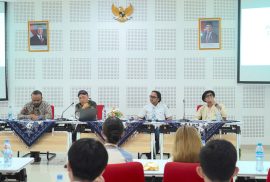Yogyakarta, 15 September 2025 – The Study Program of Javanese Language, Literature, and Culture, Faculty of Cultural Sciences, Universitas Gadjah Mada (FIB UGM), presented artist Paksi Raras Alit in an Expert Lecture themed “Adapting Ancient Manuscripts into Performing Arts.” On this occasion, Paksi delivered a presentation entitled “From Page to the Stage: Manuscript to Stage Performance” which highlighted the creative process as well as the challenges of transforming ancient texts into stage performances.
Paksi explained that adapting ancient manuscripts into the performing arts is not merely transferring written texts into forms of drama, theater, wayang, or music. Rather, it involves a long process of rewriting, editing, adapting, and developing imagination to bring the text to life on stage. This creative process covers several crucial stages, including imaginative exploration, content adaptation, co-modification with the creative team, and technical production. Ultimately, all these steps are directed toward creating a performance that can be understood and appreciated by the audience.
However, significant challenges inevitably arise throughout the process. Paksi emphasized the fundamental questions that every artist or creator must answer: Where should one begin? What needs to be included or omitted? How can long descriptive passages about characters, places, and events be translated into a stage performance? Should all dialogues be presented in full? Often, manuscripts feature characters who speak in lengthy, elaborate texts that must be condensed to remain effective on stage.
This discussion demonstrated that performing arts are not merely a form of entertainment but also a meeting space between text, creativity, and audience. Furthermore, the creative endeavor of reviving ancient manuscripts on stage is also part of safeguarding intangible cultural heritage, in line with the Sustainable Development Goals (SDGs)—specifically Goal 4 on Quality Education, which encourages knowledge development based on tradition, and Goal 11 on Sustainable Cities and Communities, through the preservation and actualization of cultural heritage in a modern context.
Through this event, FIB UGM reaffirmed its commitment as an academic space not only to study ancient manuscripts but also to connect them with performing arts, ensuring that tradition remains relevant and can be passed down across generations.
[Public Relations of FIB UGM, Alma Syahwalani]








